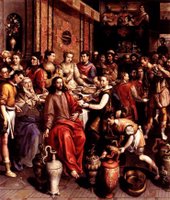Epiphany
Q: Is Epiphany an important part of the Church calendar?
 A: Epiphany is both a specific day celebrated in the Church and the season which follows. Literally meaning “appearance, manifestation, showing,” the day celebrates the visit of the wise men recorded in Matthew 2:1-12. In most of Christianity, 6 January is the date that The Epiphany of Our Lord is observed.
A: Epiphany is both a specific day celebrated in the Church and the season which follows. Literally meaning “appearance, manifestation, showing,” the day celebrates the visit of the wise men recorded in Matthew 2:1-12. In most of Christianity, 6 January is the date that The Epiphany of Our Lord is observed.The Sunday after Epiphany Day traditionally remembers His baptism (Matthew 3:13-17). Subsequent Sundays show how the Christ was manifested through preaching and miracles. For example, Saint John concludes his account of the miracle at Cana, by telling, “This, the first of his signs, Jesus did at Cana in Galilee, and manifested his glory. And his disciples believed in him. (2:11)” See Aardvark Alley for an excursis on this miracle and general comments about wine in Scripture.
Many churches conclude the Epiphany season with Jesus’ last great pre-suffering manifestation, His Transfiguration on the mountaintop before Peter, James, and John (see Matthew 17:1-13). One clearly important part of Epiphany is that Jesus shows Himself to be Savior not only of the Jews but also of the Gentiles.
Scripture quoted from The Holy Bible, English Standard Version™, © 2001 by Crossway Bibles.
Send email to Ask the Pastor.
Walter Snyder is a Lutheran pastor, conference speaker, author of the book What Do Lutherans Believe, and writer of numerous published devotions, prayers, and sermons.
Technorati Tags: Epiphany | The Epiphany of Our Lord | The Feast of the Epiphany | Magi | Wise Men | manifest | manifestation | Herod the Great | King Herod | Herod | Bethlehem | Jesus | Jesus Christ | Christ | Matthew 2 | Church Year | liturgical calendar | Christianity | Christian | Lutheran | Lutheranism | Christian feasts | festivals | commemoration | theology | Christology | historical theology | exegetical theology | Church history | Bible history | Bible | Scripture | Word of God | God's Word | New Testament | Gospel | Ask the Pastor | Aardvark Alley

0 Comments:
Post a Comment
<< Home